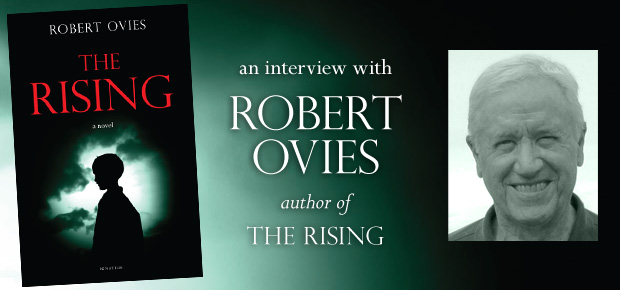
Robert Ovies is the author of the thrilling new novel The Rising, which tells the story of a young boy who mysteriously gains the ability to bring the dead back to life. He also maintains a website about the book. Ignatius Press Novels interviewed him via e-mail.
Is The Rising your first novel?
Ovies: Yes, it is. I’ve written about spiritual matters extensively and am writing two books along those lines now, but The Rising is my first novel.
It’s fascinating (and scary!) to think of all the implications of what rising from the dead would really be like. And that’s one of the things that really grabs the reader right away in “The Rising”. What kind of research did you do?
Ovies: My research has been grounded more in lived experiences than focused studies. I was a staff assistant at a funeral home, for example, a number of years ago, so I know those processes and procedures well. My daughter is Director of the Neuropsychology Department of the Illinois Neurological Institute (and author of a wonderful book for parents of special needs children) and was able to advise me relative to major hospital procedural issues in helpful detail. As a former advertising Creative Director, I’m very aware of the media and alert to its goals, tools and attention-oriented priorities. And, as a married deacon for thirty-eight years and former Director of Detroit’s Archdiocesan Offices for Family Life, Young Adult and Youth Ministries, I believe I’m well aware of church priorities and expectations across a wide range of issues. All of which, of course, have a direct bearing on the story being told in The Rising.
On a surface level, C.J., the young boy astonished by his ability to raise the dead, is the protagonist of “The Rising”. But it’s also about his parents, Lynn and Joe. And about his pastor, Father Mark. And then there are others—one of the strengths of the book is how the pivotal events in the story create tension in how each character reacts. How did you go about getting a handle on all of these characters?
Ovies: I really doubt that I, or anyone, could write a compelling narrative about individuals that they haven’t personally experienced in some ways over the years. So, yes, I do feel that I know each of the principal characters in the book, and I know them well; those you mentioned, and also Anthony Cross and the men that work for him, Lynn’s friend, Nancy Gould, Giles MacInnes, the undertaker, Cardinal Schaenner, who stretches so hard to help something globally life-changing take place during his watch, and Benjamin Reed, who is driven by a globally life-changing vision of his own. In fact, to the extent that readers relate to one or more of them, I believe it will be because these characters, although fictionally positioned, will somehow be experiencing and reflecting many of the same thoughts and emotions as the readers themselves.
Another thing that is explored in The Rising is how thoroughly permeated the world is by the media. Did you take any inspiration from specific news events?
Ovies: I’ve simply observed what any reader of the novel must have observed, and that is that today’s “newsertainment industry,” in its 24/7 competition for higher programming ratings, is more than ever before driven toward the sensational, the shocking, the most breath-taking spin in every story. Who among us can’t draw up a pretty realistic scenario about the extent of media intrusion and hype that would follow a nine-year old boy’s actually being able to raise a man proven beyond doubt to be absolutely stone-cold dead back to life again?
Another theme that crops up in the book is the idea of power: many characters in the book see C.J.’s ability as a means to power. Can you elaborate on that?
Ovies: I do believe that — if not power in and of itself — the quest to gain and maintain power does, in fact, “corrupt”, and the quest to gain and maintain absolute power “corrupts absolutely.” That’s why I found it such an interesting thread for a novel: that the power over death (which is masked as being the absolute power) would spring up through a defenseless nine-year old who didn’t ask for it, didn’t expect it, didn’t really want it, and doesn’t know what to do with it now that he has it. Everyone else in the novel has a clear idea of what he or she want to do with it, that’s for sure; from his mom, who wants it gone, to his dad, who wants to get rich through it, to the public that presses in to be saved by it, to the media, the government, the church officials and more. Because power leads to control. And, really, how many of us could avoid the magnetic attraction of acquiring for ourselves a literally death-breaking control over our own lives and the lives of others?
What is your writing process like?
Ovies: I found, in considering what might happen if someone as vulnerable as a nine-year old in a broken family was found, with proof-positive, to be able to control death itself, that the story developed as my imagining followed a possible trail from one ensuing point to another. I didn’t have it all mapped out before I began writing. I imagined, and then I wrote until I stopped to imagine again, at which time I was off again, although from a then-fresh jumping-off spot. I had no doubt that it would take me into some really interesting places and into the hearts and minds of some really interesting characters. So I’d write, pause to consider, and write again, in large part to find out for myself what on earth would happen next. That was really the pleasure of writing it: discovering the story myself as the various players took on flesh and blood and began mapping out new events for me as I went along for the ride, going from character to character and situation to situation and crisis to crisis until I found that it was all well resolved in the end. I wouldn’t be surprised to find out that that’s an unusual writing process, but that’s what the process for writing this novel was for me.
Reading your short bio from the back flap of the book sounds like a whirlwind tour of every walk of life in America! From advertising executive to Catholic deacon to co-director of a halfway house—that’s a pretty wide range! Do you think the breadth of your life experiences helped bring to life the varied characters in your book?
Ovies: There’s no doubt about that. Again, I believe that I do know, that I’ve met and watched and come to understand, each one of the main characters involved. And I’m really glad I can say that my sense about each of them, while not being necessary admiring, is honestly sympathetic. They’re all doing what they think they should be doing at this or that given time, and even trying in their own ways to think of things beyond themselves. That, I hope, is one thing that will make their story, even beyond its fictional reach, a story about relatable, everyday people who suddenly find themselves being swept away by wholly unexpected and dramatically alarming events.






pauline campbell
June 1, 2014 at 12:20 am
The fact that this was a young boy, reminded me of the children at Fatima and could realize what treatment this little boy would possibly experience at the hands of authorities not to mention what the media would have done with this story.